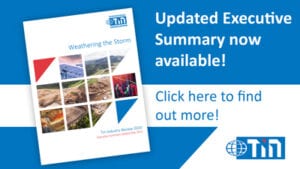Tension remains high between the state owned Colquiri Mining Company (EMC) and local mining cooperatives regarding a disagreement over access rights to particular mining levels of the Colquiri tin and zinc mine in La Paz, Bolivia, as reported by local newspaper, La Razon. The row started when the state-backed workers began working levels of the mine claimed by the local co-operatives.
The cooperatives have stressed that they are not in conflict with the EMC, but they have declared a state of emergency in defence of their mining areas. La Razon reported that a recent attack on the air system of the mine, using dynamite and compressed air, caused US$ 300,000 worth of damage. The President of the The National Federation of Mining Cooperatives (Fedocomin), Federico Escobar, has warned that demonstrations and protests are possible should a resolution not be reached, which could include roadblocks during the visit of Pope Francis to the country in July.
Bolivian tin mine production in Q1 totalled 4,654 tonnes of tin-in-concentrate. This represents a rise of 21% compared to Q1 2014 but a 13% decrease compared to the previous quarter. However, tin production from the state-owned operations at Colquiri and Huanuni has fallen 21% from the last quarter to 2,783 tonnes. The current low tin price has affected the Huanuni mine in particular, which reported a US$ 4 million loss in the first quarter of 2015 and has announced a series of cost-cutting measures to regain profitability. It is likely that the ongoing dispute at Colquiri has affected production.
The sustainability of Bolivian production has also been questioned; a preliminary Mining Sector Development Plan, prepared by the Bolivian Ministry of Mines, has highlighted a lack of investment in development of tin reserves by Comibol and mining cooperatives as a medium and long term problem in maintaining levels of tin production domestically.


